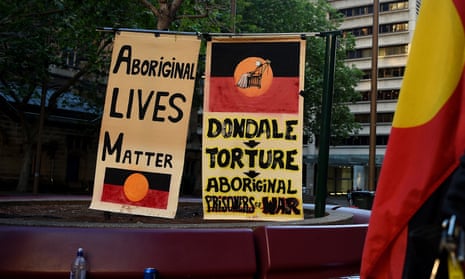My heart broke with the devastating news last week that 19-year-old youngfella Stanley from my home state Western Australia was found unresponsive at privately run Acacia prison.
Another black death in custody. It comes after at least 437 other deaths since 1991, according to Guardian Australia.
He was so young. He was eligible for release in six months. While the Black Lives Matter protests continue, there’s been little media coverage or outrage over his death from the broader community. The silence is suffocating.
It’s reported that he was struggling with imprisonment. Prisons have devastating and far too often lethal consequences for our people. The impacts are particularly severe for young people and can lead to self harm and cause lifelong damage.
Despite this, Australian governments continue to imprison children as young as 10. In every state and territory, you can be too young to be on Facebook but apparently old enough to be strip-searched in prison.
Our kids are criminalised at extreme rates. About 65% of 10- to 13-year-olds in prison are Aboriginal and Torres Strait Islander kids, despite making up only 6% of the youth population.
Last year 12-year old Dujuan Hoosan, an Arrernte and Garrwa youngfella from Alice Springs and star of In My Blood It Runs, travelled to the United Nations to tell the world that Australia must “stop cruelling 10-year-olds in prison”. Dujuan wants Australian governments to raise the age of criminal responsibility to at least 14.
We’ve seen the horrors of Don Dale, Cleveland, Banksia Hill and Brisbane’s police watch houses. Youth prisons in Australia have a history of abuses of Aboriginal and Torres Strait Islander kids – employing practices like solitary confinement, hog-tying, sedating, hooding and gassing.
Over the years, as a legal expert and human rights campaigner, I have worked with many of our kids, young people and their families, from Mount Isa to Perth to Alice Springs, Melbourne to Redfern to Palm Island. The stories are hauntingly similar. Experiences of police racism, violence, racial profiling and harassment. Our young ones are abused in youth prisons without accountability.
Most are being criminalised for the disadvantage their families have been pushed into, leaving them charged with minor offences like theft, traffic and public order offences. Aboriginal and Torres Strait Islander legal services have represented clients charged with stealing a chocolate frog or bread.
This is the legacy of colonisation: kids locked up, taken far from their families, communities and culture – the system stacked against them at every turn. Telethon Institute research tells us that about 90% of kids in youth prison in WA have identifiable psycho-social and cognitive disability. More than half of our kids in prison have been removed from their families by child protection.
We can change this injustice right now. On Monday, attorney generals from across the country will meet to decide whether they will raise the age of criminal responsibility from 10 to at least 14.
This one change will have an immediate and generational impact on the over-incarceration of our kids. The younger a child is locked up, the higher their likelihood of returning to prison. The Australian Institute of Health and Welfare reports 94% of imprisoned children aged 10 to 12 returned to prison before they were 18, the rate of return decreasing with each year of age.
The Australian Indigenous Doctors Association, the Australian Medical Association and the Royal Australian College of Physicians have all joined the call to raise the age. Kids under 14 are more likely to lack impulse control, and have not yet developed the cognitive capacity to understand the likely criminal consequences or impact of their actions.
While much of the world has caught up with this medical science, Australia is lagging.
Globally the median age of criminal responsibility is 14. Countries like Germany, France, Chile and Italy all have a minimum age of 14 and have low rates of imprisonment of children.
Unlike prisons, Aboriginal-led alternatives to imprisonment are effective and help kids’ lives. To name a few: Aboriginal Legal Service of WA’s youth engagement program, Deadly Connections’ youth programs, Djirra’s Young Luv, Red Dust Healing, Bushmob, Redfern’s Clean Slate Without Prejudice, Sisters Inside’s First Nations Girls art group, Bourke’s Maranguka Justice Reinvestment program, and bail support programs. These work because they connect kids with the inherent strengths of our culture, country and community while diverting them from prison. What they lack is public funding.
We absolutely have to reimagine our whole justice system with structural change to undo the systemic and direct racism built into its foundations. Build futures – not prisons, which are no place for a child. Raising the age is one small step that governments can take right now which we know will change the life of generations of our young people.
We need governments to use decarceration strategies, so every First Nations kid has a healthy body and spirit; their family is supported, strong and connected in a safe and secure home; with access to culturally safe legal, disability, family violence, education, and health supports.
We need to see change now, in our lifetimes. I don’t want my kids and grandkids to face these injustices. We know our kids shine when they are supported, given opportunities, strong in community, culture and connection to country.
It’s time for governments to raise the age of criminal responsibility to at least 14. Because Black Lives Matter, our young people’s lives matter. They always have and always will.
Roxanne Moore is a Noongar woman and human rights lawyer from Margaret River in Western Australia. She is the executive officer for the national peak body on Aboriginal and Torres Strait Islander Legal Services
